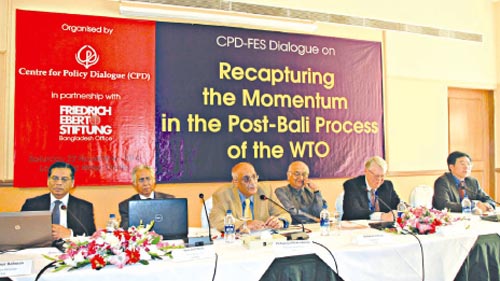Experts advise LDCs at CPD-FES dialogue
Trade experts on Saturday suggested that the least developed countries including Bangladesh should immediately undertake necessary preparation to reap benefits from negotiations on new and emerging trade issues and to bring momentum in the current trade negotiations of the World Trade Organisation.
LDCs will face difficulties and fail to reap the potential benefits from those issues including investment, connectivity, regional trade and technology if they do not prepared them through proper homework, they said.
At a dialogue on recapturing the momentum in the post-Bali process of the WTO at a hotel in Dhaka, they also suggested that LDCs should take initiatives to narrow down the differences among them particularly on duty- and quota-free access in the markets of different developed countries.
Local think-tank Centre for Policy Dialogue and Germany-based Friedrich Ebert Stiftung organised the dialogue.
Expressing dissatisfaction over no visible progress on the outcome of the ministerial level meeting held in Bali, Indonesia in 2013, experts said that there was no progress in providing LDCs with full DF-QF market access in the developed and developing countries.
Even no progress is yet to be happened regarding operationalisation of the services waiver offered to LDCs and implementation of the preferential rules of origin, they said.
‘The current trade negotiation of WTO, known as the Doha Development Round, should be successfully completed within the shortest possible time addressing the LDCs’ concerns including DF-QF market access and operationalisation of services waiver,’ CPD distinguished fellow Debapriya Bhattacharya said.
After completion of Doha Round, a new negotiation focusing LDCs interests in new and emerging economic issues including investment, connectivity, global supply chain and climate change should be introduced, he said.
Richard O Cunningham, chairman of Washington-based Cordell Hull Institute, said that LDCs should adopt new approach of trade focusing new and emerging markets instead of giving extensive importance on markets of European Union and USA.
‘Such new approach can change the existing trade sequence,’ he said.
He said that LDCs should focus on involvement in global supply chain and exporting services as both have become the most important issues in global trade scenario.
CPD executive director Mustafizur Rahman said the implementation of the decision of giving full DF-QF market access to LDCs particularly in the USA market was most important for Bangladesh as the major exportable products including apparel items were not getting such access there under the US GSP scheme.
Some African countries are opposing the issue of providing DF-QF market access for apparel items in the USA market fearing that their exports would be hampered, he said.
‘LDCs should take initiatives to narrow down such differences,’ Mustafizur said.
He said that LDCs needed serious work to articulate their demands and concerns in the negotiations.
Indian Council for Research on International Economic Relations trade policy and WTO Research Programme chair professor Anwarul Hoda advised LDCs to gain some meaningful results from the negotiations so that they could achieve all the goals. He also recommended incorporation of mega trade block to attain cherished results.
China Centre for International Development director Longyue Zhao emphasised on the issues of connectivity especially region-to-region and country-to-country connectivity to overcome the difficulties related to emerging and new trade issues.
CPD chairman Rehman Sobhan and FES country representative Henrik Maihack also spoke at the dialogue while experts from Brazil, China, India, Pakistan, Nepal and South Africa attended.
Source: Newage

